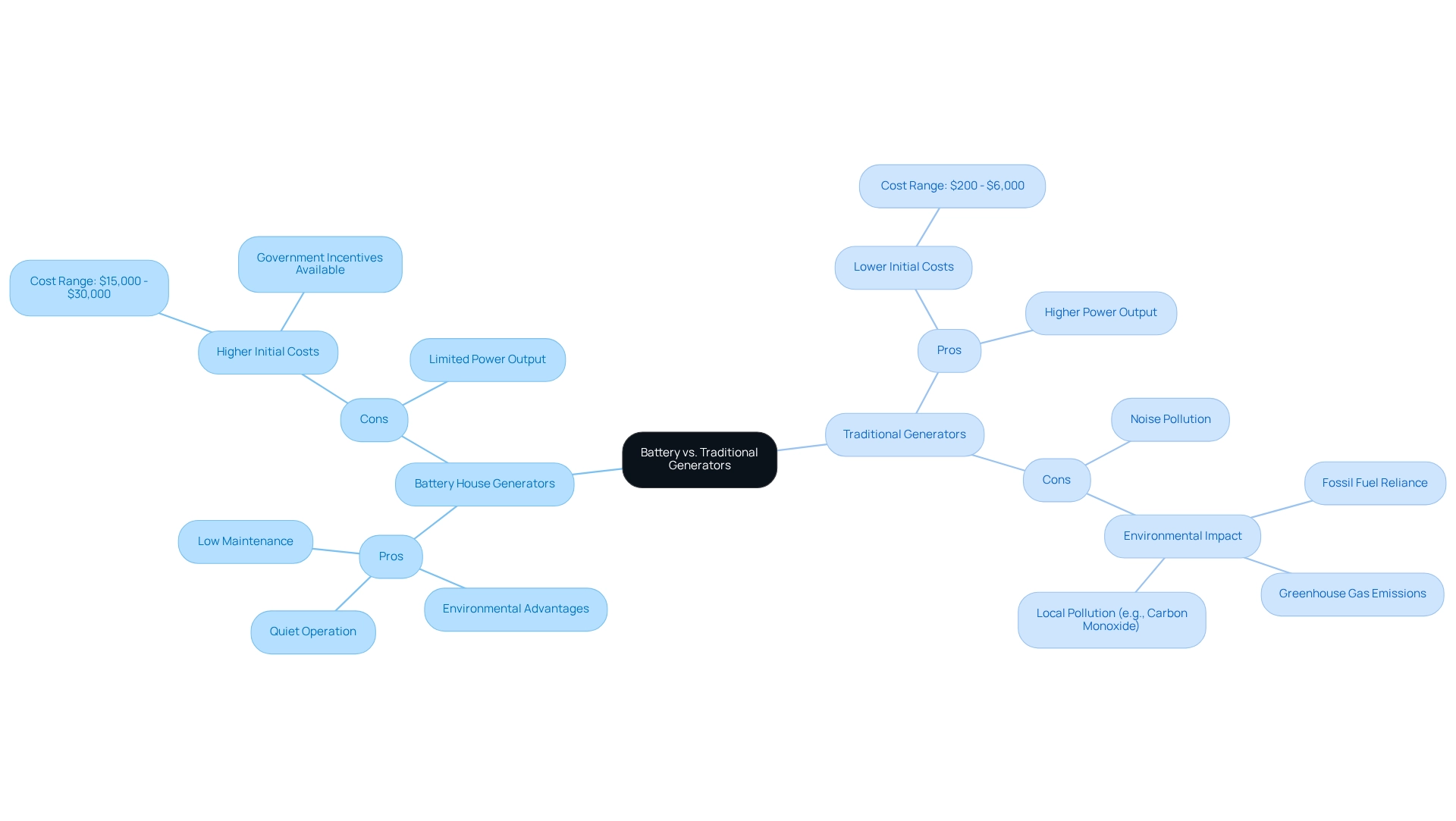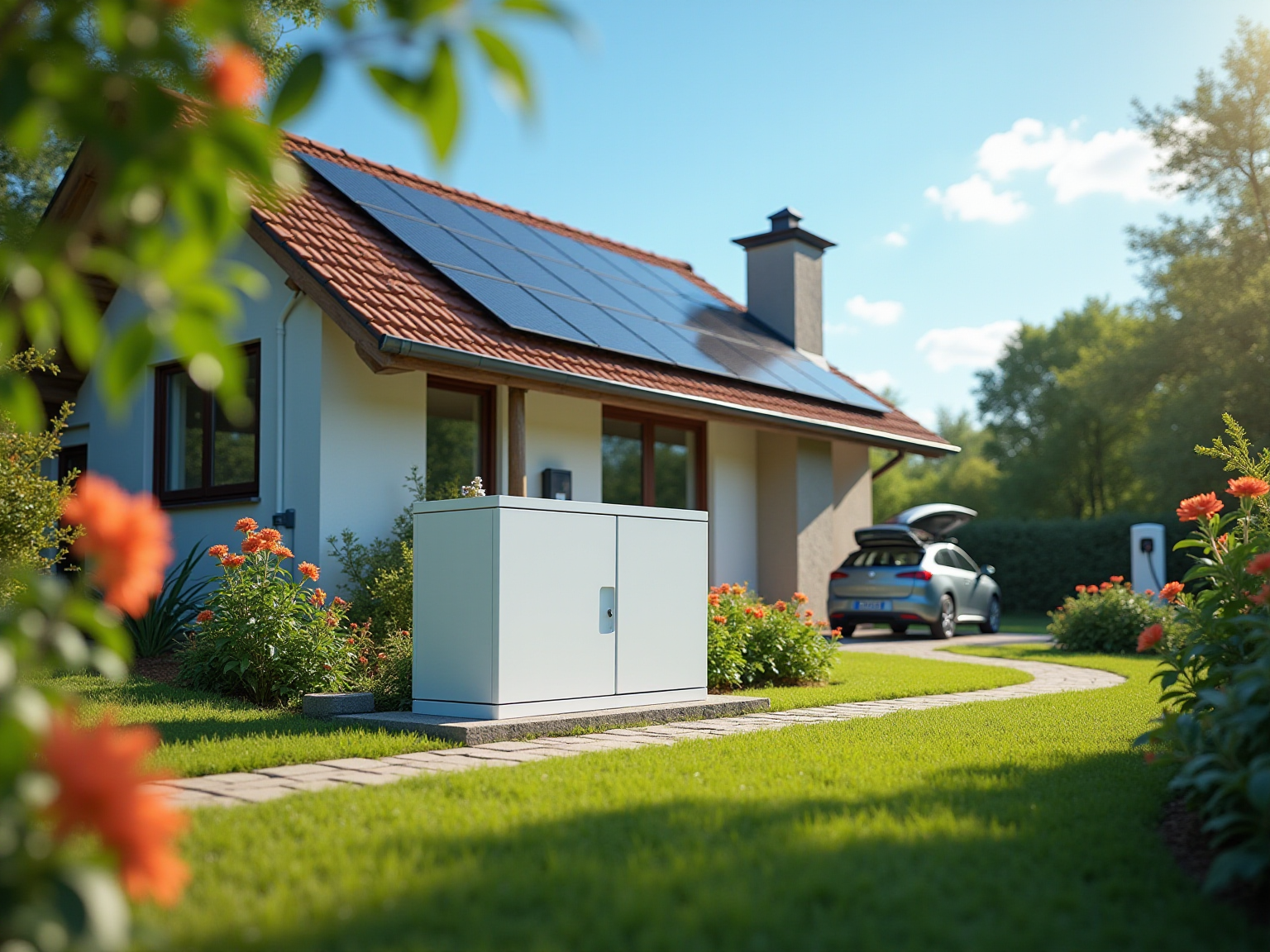Overview
As homeowners, we often worry about rising energy bills and the environmental impact of our choices. Battery house generators present a sustainable and quiet alternative to traditional generators, which are typically noisy and reliant on fossil fuels.
While it’s common to feel hesitant about the initial investment, it’s important to consider the long-term savings they offer. These systems not only reduce your environmental footprint but also require less maintenance, making them an appealing option for those of us who care about our planet.
Together, we can explore reliable power solutions that align with our values. Imagine enjoying the peace of mind that comes with energy independence, knowing you are making a positive impact.
If you’re ready to take the next step towards a more sustainable future, let’s work towards finding the perfect solution for your home.
Introduction
In the quest for reliable power solutions, we understand that homeowners are increasingly faced with the choice between battery house generators and traditional generators. As energy demands rise and environmental concerns grow, it’s common to feel overwhelmed by these options.
Battery backup systems offer a clean, quiet alternative powered by renewable sources, which can alleviate worries about emissions and noise. On the other hand, traditional generators provide robust performance, yet they come with the drawbacks of noise and environmental impact.
This article delves into the strengths and weaknesses of both options, guiding you through the decision-making process to find the best fit for your energy needs and sustainability goals.
By examining key factors such as:
- Power requirements
- Budget
- Environmental impact
Together we can gain valuable insights into making a choice that not only protects your home during outages but also aligns with modern eco-friendly practices.
Let’s explore these options with care and consideration for your unique circumstances.
Understanding Battery House Generators and Traditional Generators
Are you feeling overwhelmed by rising energy bills? Battery house generator systems, also known as battery backup units, are here to help. These battery house generators are designed to store energy for later use, primarily sourced from solar panels or the grid, providing a clean, quiet, and efficient power supply during outages. This makes them particularly appealing to eco-conscious homeowners like you.
In contrast, traditional machines that typically run on gasoline or propane produce electricity only as needed. These machines can be noisy and require fuel storage, which can pose challenges for residential use. We understand that you want a solution that aligns with your values and lifestyle.
The ecological impact of these setups is significant. Conventional generators emit greenhouse gases, making them less efficient compared to storage units. As more homeowners pursue sustainable power options, the benefits of backup solutions become clear. For instance, many solar energy storage systems come with warranties lasting 10 to 15 years, ensuring long-term reliability and performance. Well-known choices like the Tesla Powerwall demonstrate how modern storage solutions can seamlessly integrate with solar power configurations, offering both efficiency and sustainability.
In addition to power solutions, you might also consider Tesla home chargers, which enhance solar setups by enabling electric vehicle charging directly from solar power. Government initiatives that encourage solar energy usage can further increase the attractiveness of these solutions, making them more accessible and economical for you.
Expert insights emphasize the advantages of energy storage systems. Some residential energy storage units function similarly to large portable power stations, requiring minimal installation effort, such as incorporating a transfer switch or smart electrical panel. This ease of use enhances their appeal for residential applications, as noted by Cynthia R Matonhodze.
When evaluating your options, consider factors such as configuration, capacity, cost, and solar-readiness. A case study titled ‘Choosing Solar Backup Options’ highlights that selecting the right solar storage solution can lead to long-term savings and energy independence. Models like the Tesla Powerwall and LG Chem RESU showcase dependable performance. Pricing for these systems varies, with the Tesla Powerwall typically costing around $10,500, including installation, while LG Chem RESU options may range from $7,000 to $8,000, depending on capacity and features. By choosing the right solar storage solution, you can effectively transition to sustainable energy practices while safeguarding your home against power disruptions.
In summary, understanding the key differences between energy storage systems and conventional power sources is essential for homeowners seeking to invest in backup energy solutions. The shift towards battery house generators not only aligns with eco-friendly values but also meets the practical needs of modern households, especially for those who prioritize sustainability. Together, we can work towards a more sustainable future.
Pros and Cons of Battery House Generators vs. Traditional Generators
Battery house generators present a compelling option for homeowners, especially those looking to embrace sustainable energy solutions. Many of us are concerned about rising energy bills and the impact of our choices on the environment. The benefits of these systems are noteworthy:
- Quiet Operation: Imagine enjoying the peace of your home without the constant hum of machinery. These systems operate silently, making them perfect for residential neighborhoods where noise can be a concern.
- Environmental Advantages: By generating no emissions, battery-powered devices align with sustainable practices, helping to reduce our carbon footprint. This is increasingly important as we seek eco-friendly options like solar panels and Tesla home chargers to enhance our energy efficiency.
- Low Maintenance: Unlike conventional power sources, energy storage solutions require significantly less upkeep, allowing you to enjoy reliable electricity without the hassle of regular servicing.
However, we understand that battery house generators also come with some drawbacks:
- Higher Initial Costs: The upfront investment can be substantial, typically ranging from $15,000 to $30,000. This might feel overwhelming, but remember, government programs may offer incentives to help ease this financial burden.
- Limited Power Output: While these devices are efficient, they may struggle to support multiple high-demand appliances simultaneously, which can be a concern during power outages.
On the other hand, traditional generators have their own set of advantages:
- Lower Initial Costs: They are generally more affordable to purchase and install, with portable generators costing about $200 to $6,000, making them accessible for a wider range of budgets.
- Higher Power Output: Conventional generators can power multiple high-demand appliances at once, providing a robust solution during outages.
Yet, it’s important to consider the significant downsides of traditional generators:
- Noise Pollution: Their operation can be quite loud, disrupting the tranquility of residential areas.
- Environmental Impact: These devices rely on fossil fuels, contributing to greenhouse gas emissions and local pollution, including harmful substances such as carbon monoxide. As Spencer Fields notes, “Generators cause significant local pollution by burning fossil fuels.”
Real-life experiences highlight the effectiveness of these power sources. Homeowners who have made the switch to a battery house generator often express satisfaction with its quiet operation and environmental benefits, even in light of the higher initial costs. Experts agree that while battery house generators are more environmentally friendly, they might not yet match the energy output potential of traditional models.
In terms of expenses, while battery systems may require a larger upfront investment, they can lead to savings over time through reduced utility bills and maintenance costs. We encourage homeowners to compare estimates and explore installation discounts, especially during off-peak seasons or special promotions, to make the most of their investment in energy solutions. It’s essential to recognize that battery-powered systems and energy storage devices serve distinct purposes, with energy storage being more versatile in specific applications. Ultimately, the choice between battery and conventional power sources will depend on your individual needs, budget, and environmental priorities. Together, we can navigate these options to find the best solution for your home.

Choosing the Right Generator for Your Home: Key Considerations
When it comes to choosing a power source, we understand that homeowners often feel overwhelmed by the options available, including the battery house generator. It’s essential to carefully evaluate several critical factors, including your power needs, to select the best battery house generator for your needs: Start by assessing the total wattage required to run essential appliances during an outage. Understanding your average power requirements is crucial, especially for California residents who may need equipment capable of powering multiple devices simultaneously. Midsized inverter units, for example, can operate for 8 to 25 hours using only 2 to 3 gallons of gas, making them an efficient choice for extended outages.
- Budget: It’s important to determine your budget for both the initial investment and long-term operational costs. While conventional power sources may have lower initial expenses, battery-operated alternatives can save you money on fuel and maintenance over time. Moreover, consider the potential of storing solar electricity, which can further enhance your energy independence and reduce reliance on traditional fuel sources.
- Installation Requirements: Take a moment to assess the available area for installation and any modifications that may be necessary. For instance, standby power sources cannot be installed in flood-prone areas and are not portable, which can limit your placement options.
- Environmental Impact: Reflect on the ecological footprint of your choice. Battery-operated devices, such as a battery house generator, typically have a smaller environmental impact, aligning with the eco-friendly practices that many homeowners prioritize. Additionally, storing solar electricity not only supports this goal but also provides a reliable energy supply during outages, safeguarding your family from blackouts.
- Maintenance: It’s vital to understand the upkeep requirements for each type of power source. Regular maintenance is essential for reliability and longevity, particularly for conventional power sources that may require more frequent servicing.
- Expert Advice: Families with young children or elderly parents find these devices particularly practical. These vulnerable segments of the population are often less adaptable to extended outages, highlighting the importance of choosing the right power source.
- Practical Guidance: We encourage homeowners to utilize online calculators and consult with power supply companies to effectively determine their needs. This proactive approach ensures you select a generator that meets your specific power requirements.
- Case Studies: The significance of selecting the right size and capacity for a home generator cannot be overstated. It’s crucial to avoid overspending on unnecessary capacity while ensuring you have adequate power during outages.
By thoughtfully considering these factors, you can make informed decisions that align with your lifestyle and energy needs, ensuring you are well-prepared for any power disruptions. Together, we can navigate this journey towards energy independence and security.
Conclusion
The choice between battery house generators and traditional generators is a significant one for homeowners who are looking for dependable power solutions. We understand that concerns about energy bills and sustainability weigh heavily on your mind. Key considerations such as your power requirements, budget, and the environmental impact of your decision are crucial in guiding this choice. Although battery systems may have a higher initial cost, they provide quiet operation, low maintenance, and zero emissions, making them an appealing option for those who are committed to sustainable living. On the other hand, traditional generators might deliver higher power output at a lower upfront cost, but they often come with the drawbacks of noise and environmental pollution.
Ultimately, the right generator choice hinges on your individual needs and circumstances. It’s common to feel overwhelmed by the options available. Take the time to evaluate your specific power needs, consider long-term costs, and weigh the ecological implications of your choice. By approaching this decision thoughtfully, you can find a solution that not only safeguards against outages but also aligns with your modern eco-friendly values.
In a world that increasingly prioritizes sustainable living, investing in a generator that meets both practical and environmental criteria is more than just a smart decision—it’s a commitment to a cleaner, more resilient future. As energy demands continue to rise, making an informed choice will empower you to navigate power solutions that protect your home while positively contributing to our planet. Together, we can work towards a brighter, more sustainable future.


